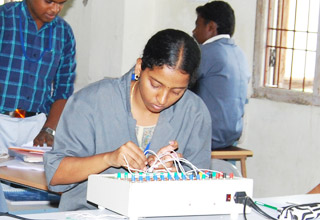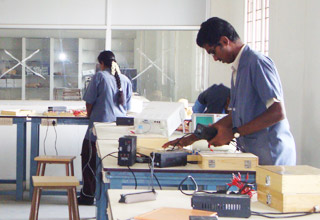| S.No | Faculty Name | Designation |
| 1 | Dr. DURGADEVI G | Professor / Head |
| 2 | Dr. M.JASMIN | Professor |
| 3 | Dr.V.MANGAIYARKARASI | Professor |
| 4 | M.SUGANYA | Assistant Professor |
| 5 | V.HEMAMALINI | Assistant Professor |
| 6 | G.VIJAYAKUMARI | Assistant Professor |
| 7 | S. SIVAKAMI | Assistant Professor |
| 8 | G.SHEEBA | Assistant Professor |
| 9 | N.ARUN BALAJI | Assistant Professor |
| 10 | SIVA RAMALINGAM | Assistant Professor |
| 11 | VASANTH V | Lab Instructor |
| 12 | ANBARASAN R | Lab Instructor |

The Department of Electronics and Communication Engineering was started during the academic year 2008-2009. It has an aim enhancing the ability of the students to compete internationally with innovative ideas and solutions in the recent trends of electronics and communication engineering. The strength of the department is that it has well experienced faculty members who are specialized in streams of engineering. The laboratories are fully equipped with latest facilities for imparting quality education.
Besides the high quality education, the department motivates the students in co-curricular and extra-curricular activities. By memorandum of understanding, the department made industrial visits to many industries. Thereby, it reduces the bridge gap between academic and industries. The infrastructure and lab facilities are upgraded from time to time and adequate opportunities are provided to the students to learn and expertise their skills. The department conducts industry-insttitute interaction in a regular intervals and prepare the students to update themselves in the field.
The department has the following well equipped laboratories:
- Communication system laboratory
- Microprocessor and Microcontroller laboratory
- Integrated circuits laboratory
- Electronic device and circuits laboratory
- VLSI/ DSP laboratory
- EDC laboratory

The department conducted a National Level Technical Symposium CRISPO’14 as a part of TECHPLEX’14. Dr.G.Gnanasivam, Prof. & Head, Dept. of ECE, Agni College of Tech, Chennai inaugurated the function. A National conference on emerging trends in electronics and communication engineering (NCETECE’14) was conducted on 16-04-2014. It was inaugurated by Mr.A.Thangasamy, Head – Business Operations, Samsys Technologies, Chennai. Subsequently, by this year, a National Conference on Emerging Trends in Electronics and Communication Engineering (NCETECE’15) was conducted on 06-04-2015 & 07-04-2015. This was inaugurated by Dr.Vaidehi Vijayakumar, Chairman (ICE) & Director, AU-KBC Research Center, MIT, Chennai – 44. The department has organized workshops on various areas of electronics and communication engineering.

The department has organized industrial visits and internships for the studetns of ECE. The students took part thier internships in Microedge Electronics Pvt. Ltd, Adithya Infotech, Accel IT academy, Innovative Technologies, Matrix Solutions, Technocrat Automations and L&T Infotech. The students also took part in their industrial visits programs in Chennai Port Trust, All India Radio, Air India and BSNL. Our College signed an MOU with INTEL through FICE Systems. With the expert’s advice from INTEL, the following projects are undergoing at present.
They are: An Embedded Real-Time Finger-Vein Recognition System for ATM Security, Drawbot – futuristic approach to turn pixels into drawing, Embedded assisted real time management of sewage control, Automatic Integrated inverter type smart device for safe kitchen, User Identification for Home Entertainment Based on Free-Air Hand Motion Signatures, and Real Time Implementation of Current Situation of Digitalized ship navigation system for safety. The students have been placed in SYNTEL Corporation, L&T Infotech, CTS, TCS, INFOSYS, Congruent Technologies, AMI, FSS Ltd, NEWGEN Technologies, Data Pattern and Nokia.
To excel in technical education and research in area of Electronics and Communication Engineering and to produce skilled, trained and competent individuals with high motivation to meet the present day challenges of the society.
- To offer qualitative education and professional ethics of global standards through innovative methods of teaching and learning with practical orientation so as to prepare students for successful career.
- To foster culture of innovation and research in the field of Electronics & Communication engineering.
- To provide best learning environment to the students, faculty and staff members conducive to creating excellence in technical education.
- To inculcate ethical, moral values and lifelong learning skills in students to address the societal needs.
- To enable students to develop skills to solve complex technological problems of current times.
- To enable graduates to pursue research, or have a successful career in academia or industries associated with Electronics and Communication Engineering, or as entrepreneurs.
- To provide students with strong foundational concepts and also advanced techniques and tools in order to enable them to build solutions or systems of varying complexity.
- To prepare students to critically analyze existing literature in an area of specialization and ethically develop innovative and research oriented methodologies to solve the problems identified.
Engineering Graduates will be able to,
- Engineering knowledge: Apply the knowledge of mathematics, science, engineering fundamentals, and an engineering specialization to the solution of complex engineering problems.
- Problem analysis: Identify, formulate, review research literature, and analyze complex engineering problems reaching substantiated conclusions using first principles of mathematics, natural sciences, and engineering sciences.
- Design/development of solutions: Design solutions for complex engineering problems and design system components or processes that meet the specified needs with appropriate consideration for the public health and safety, and the cultural, societal, and environmental considerations.
- Conduct investigations of complex problems: Use research-based knowledge and research methods including design of experiments, analysis and interpretation of data, and synthesis of the information to provide valid conclusions.
- Modern tool usage: Create, select, and apply appropriate techniques, resources, and modern engineering and IT tools including prediction and modeling to complex engineering activities with an understanding of the limitations.
- The engineer and society: Apply reasoning informed by the contextual knowledge to assess societal, health, safety, legal and cultural issues and the consequent responsibilities relevant to the professional engineering practice.
- Environment and sustainability: Understand the impact of the professional engineering solutions in societal and environmental contexts, and demonstrate the knowledge of, and need for sustainable development.
- Ethics: Apply ethical principles and commit to professional ethics and responsibilities and norms of the engineering practice.
- Individual and team work: Function effectively as an individual, and as a member or leader in diverse teams, and in multidisciplinary settings.
- Communication: Communicate effectively on complex engineering activities with the engineering community and with society at large, such as, being able to comprehend and write effective reports and design documentation, make effective presentations, and give and receive clear instructions.
- Project management and finance: Demonstrate knowledge and understanding of the engineering and management principles and apply these to one’s own work, as a member and leader in a team, to manage projects and in multidisciplinary environments.
- Life-long learning: Recognize the need for, and have the preparation and ability to engage in independent and life-long learning in the broadest context of technological change.
- To analyze, design and develop solutions by applying foundational concepts of electronics and communication engineering.
- To adapt to emerging information and communication technologies (ICT) to innovate ideas and solutions to existing and novel problems.















